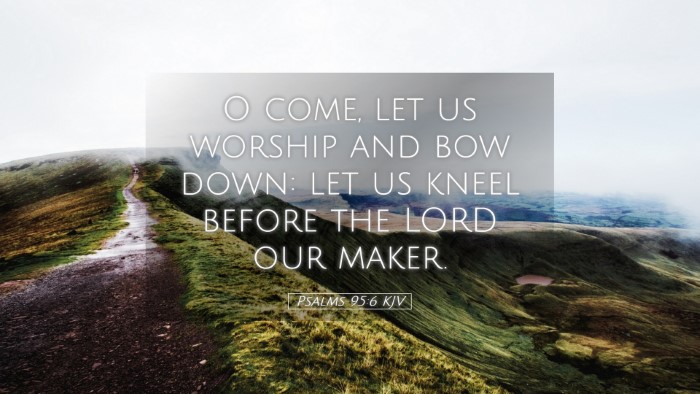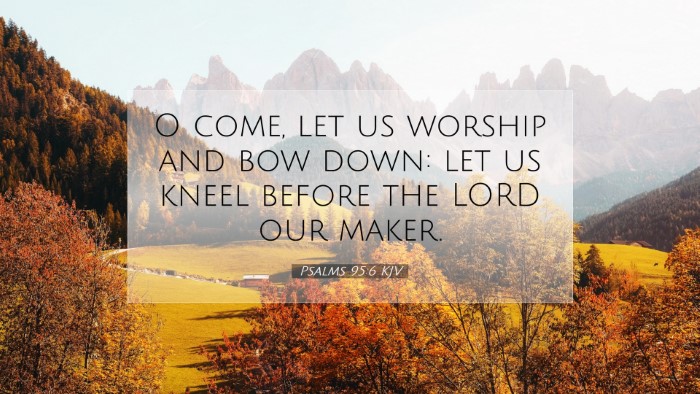Psalms 95:6 - A Commentary
Verse Text: “O come, let us worship and bow down: let us kneel before the LORD our maker.”
Introduction
This verse from Psalms 95:6 serves as a profound invitation to worship, encapsulating the essence of reverence and adoration that the believer is called to express toward God. This commentary synthesizes insights from esteemed public domain scholars such as Matthew Henry, Albert Barnes, and Adam Clarke to explore the depth and implications of this passage for scholars, pastors, and students alike.
Theological Significance
At its core, Psalms 95:6 articulates a call to worship that emphasizes the importance of approaching God with humility and reverence. It presents worship not merely as an act of singing or praying, but as a posture of the heart that recognizes God’s sovereignty and our dependence on Him.
1. The Invitation to Worship
Matthew Henry notes that the invocation to “come” suggests an urgency and a communal aspect to worship. It is a collective gathering of the faithful, which echoes the corporate nature of worship found throughout the Scriptures. The phrase “let us worship” signifies the collective duty of God’s people.
2. The Posture of Bowing Down
Further emphasizing humility, the act of bowing down and kneeling before the Lord illustrates our recognition of His majesty. Albert Barnes expounds that the physical act represents the inner attitude of submission, acknowledgment, and reverence towards God, who is not only our Creator but also our Sustainer.
3. Understanding 'Our Maker'
Both Henry and Clarke point out the significance of addressing God as “our maker.” This title indicates an intimate relationship; as our Creator, He possesses authority over our lives. Clarke elaborates on the term, highlighting that acknowledging God as our maker draws attention to our reliance on Him for existence and purpose.
The Nature of Worship
This passage encourages a deeper contemplation of what true worship entails. It intertwines our actions with our theology, suggesting that our understanding of God should influence how we approach Him in worship. The act of kneeling serves as an embodiment of humility and reverence that worship requires.
1. Worship as a Response
Adoration flows from an understanding of God’s greatness. As the psalmist invites us to worship, it is essential to recognize the motivators of such an invitation. Worship is a natural response to God's character—His love, holiness, and power. Henry posits that genuine worship arises from a heart touched by the grace and majesty of God.
2. The Emotional Aspect of Worship
The emotional connection in worship is paramount. Both Clarke and Barnes emphasize that our worship should originate from our hearts—not merely in a physical act but as an expression of our love for the Divine. This emotional engagement helps to foster a closeness to God.
The Call to Reverence
This verse draws an important distinction between casual spirituality and reverent worship. In contemporary times, the nature of worship can easily shift to a form that lacks reverence. Psalms 95:6 serves as a reminder of the need for holiness in our worship as we come before the Holy One of Israel.
1. The Danger of Familiarity
Henry warns against the danger of becoming overly familiar with God. When we forget His greatness, our worship risks becoming perfunctory. This verse urges believers to remain conscious of who God is and to worship Him appropriately, ensuring that reverence remains paramount.
2. The Communal Aspect of Worship
This passage is not solely an individual invitation but a communal call. Adam Clarke emphasizes the significance of gathering together in worship, reinforcing the idea that believers are called into fellowship with one another as they worship God. This collective unity in worship reflects the body of Christ coming together to acknowledge their mutual dependence on God.
Conclusion
Psalms 95:6 encapsulates the essence of worship through its call to humility, reverence, and communal celebration. As pastors, students, theologians, and scholars reflect on this verse, they are reminded that true worship is an engagement of the heart and spirit that humbly recognizes God as our Maker. The insights from Henry, Barnes, and Clarke reinforce the importance of maintaining a posture of adoration and absolute reverence before God, inviting believers to respond wholeheartedly in worship.


